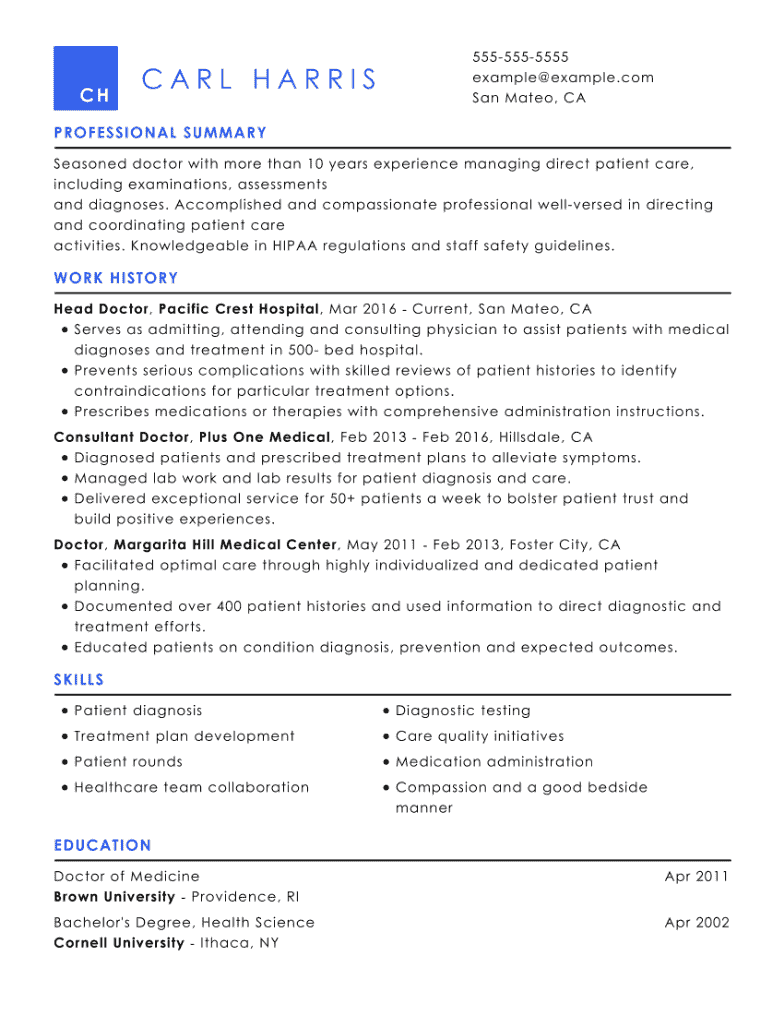Medical CV examples to help you succeed this year
Want to ensure your medical CV stands out against other candidates? Use these top CV examples and advice when crafting your medical CV.
Want to ensure your medical CV stands out against other candidates? Use these top CV examples and advice when crafting your medical CV.





OUR USERS HAVE BEEN HIRED BY

Many different types of healthcare workers may use a medical CV template. Depending on the job description, using a general medical CV sample can help you format and create your job CV. When putting your CV together, think about how you will display your skills, experiences, achievements and certifications, using these tips.
When it comes to medical CVs, hiring managers are looking closely for notable skills, achievements and outstanding elements in candidates. Displaying these characteristics in a way that will stand out to hiring managers is crucial in landing your dream medical job.
To start off your CV, include a professional summary or career objective statement that tells the hiring manager why you’re the best candidate for the job. A summary displays your best skills and career achievements, while an objective emphasises your career goals and top skills.
For your skills section, you’ll want to list hard skills and soft skills that accurately portray your health care abilities. That said, if you want to tailor your CV to the job description, pay close attention to what skills they are looking for in a candidate. If you have these skills, make sure to include them in your CV. Here are some common soft skills employers look for in health care professionals:
On the other hand, it’s also important to showcase hard skills. Here are some common hard skills for medical professional:
When you fill out your work history or experience section on your CV, make sure to write these in reverse chronological order. A professional CV will start with your most recent experience and work backward to your older work experiences. The reason for doing this is that a chronological CV doesn’t show your more recent and relevant work history. When writing your work history, make sure to include your job title, years of experience, and some key responsibilities you held while performing that job. For example, if you were a certified medical assistant, include the job title, place of work, years of experience, and a few of your daily or weekly responsibilities.
In the education section, include the name of your college or university, and your degree programme. If you didn’t go to college, you may list the name of your secondary school. Additionally, you should add notable academic awards, like participation in an honours programme.
When you reach your achievements and awards section, this is where you should talk about any awards you’ve earned or recognition from other employers or institutions. If you’re writing an entry-level CV and you don’t have much work experience, you can use this section to show off your capabilities. If you have work experience, you can write about company awards. For example, if you received employee of the month or any top-performer awards, these are great to include on your CV.
Within the healthcare industry, there are tons of certifications that can set you apart from other candidates. A few examples of medical certifications include:
If you have any of these medical certifications, they are great to add to your CV. In fact, many of these certifications stand out to potential employers and prove that you have extensive knowledge in the medical field.
If you’re not sure how to write a medical CV, you can always look over a medical CV sample to get an idea. Additionally, you can use a medical CV template to help you get a good idea of the proper CV format. Here are a few tips to keep in mind when creating your next medical CV.
Yes, most jobs require a cover letter along with your CV. Even if the job you’re applying for doesn’t require a cover letter, it’s a good way to stand out against other applicants. If you’re not sure how to create a compelling cover letter, check out some medical cover letter templates to help you get started.
While many medical jobs require a bit of experience, you may be able to secure a position based on your achievements and skills. For example, if you’ve completed medical school, highlight skills and experiences in school that give you a better chance of securing a position. Additionally, if you’ve completed medical certifications, it proves to employers that you’re dedicated and willing to learn new skills in the medical field.
Yes. You should always change up your medical CV a bit for each job you apply to. It’s crucial to tailor your CV to fit the job description and requirements for each position. Look for keywords within the requirements related to skills and qualifications, and include them in the summary, skills and work history sections of your CV if they match your own.
We personalize your experience.
We use cookies in our website to ensure we give you the best experience, get to know our users and deliver better marketing. For this purpose, we may share the information collected with third parties. By clicking “Allow cookies” you give us your consent to use all cookies. If you prefer to manage your cookies click on the “Manage cookies” link below.